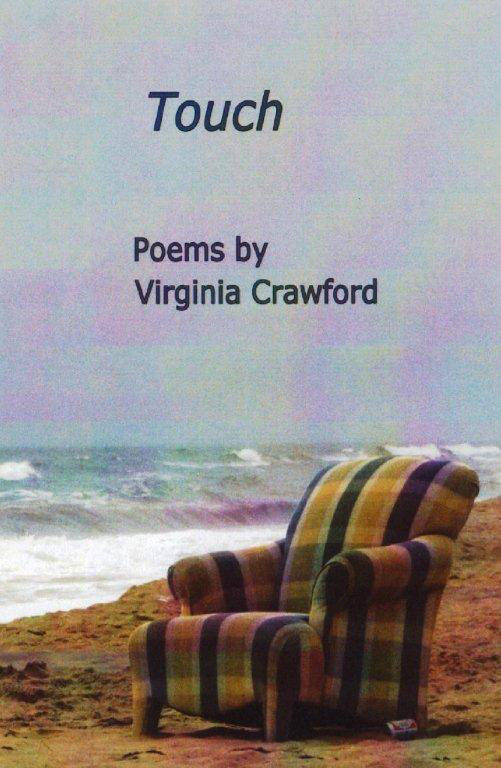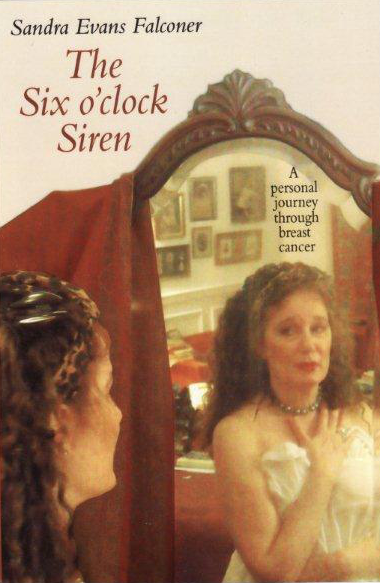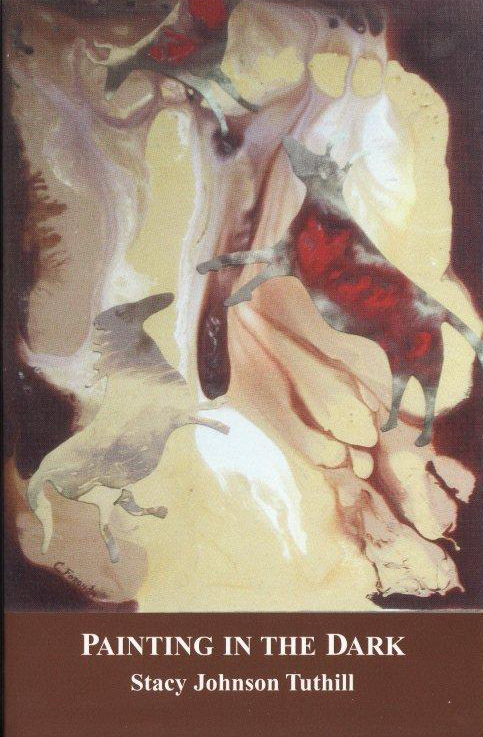Winter 2010
Table of Contents - Vol. VI, No. 4
Poetry Fiction NonFiction Reviews
Dan Cuddy
Virginia Crawford, Touch, Poems by Virginia Crawford , Finishing Line Press 2011, ISBN 1-59924-706-2 pages 41, $14.00
To order go to
www.finishinglinepress.com
Virginia Crawford’s poems in her first book Touch are wonderful to read. Even the sad and haunting poems provide a joyous aesthetic experience. In Broken Wing the poet herself as a child remembers holding an injured bird and relates that image to so much more:
Years later my parents abandoned the house,married other people. The tree still stands
and I remember the moment, the bird's heart
pounding in my palm, its dark eyes
constant, looking for what is lost.
The poet creates vivid memorable imagery and has the capacity to make those images into symbols. She gives voice to the almost inexpressible. In the first section of Planetary Light she writes:
As a childI believed sleeping in moonlight
would make me beautiful
polish me brilliant
become my core and radiate
outward for the rest of my life.
Often there is a childlike quality to her imagination, but she, as adult poet, polishes those images.The core of the poems radiate inner wonder and humanity. The Poem To My Daughter conveys the inexpressible:
The way sunshine isin the leaves, the earth
in the apple, water in wheat,
the way I can see you
in photos of our wedding
already our future.
And now finding photos
of my parents’ wedding,
the bride’s smiling face
downturned, the groom with both
eyes on the future, how comforting
to see you even there.
I think readers intuitively understand what is being said so beautifully. It would take paragraphs upon paragraphs, and without the beauty, to conceptually state what she has in a short poem. Of course, there is the love that permeates this piece. It is apparent. It is the major key of the poem.
Ms. Crawford’s work is always beaming with light. Sometimes it glistens; other times it reveals. She can express the emotionally distressing moments equally well. In While Hearing Sirens she depicts the mood with superb skill:
Even the fish upstairs are dying,parasites, all three bodies peeling
and it’s so clear they’re suffering
even if you don’t look them in the eye,
but I can’t tell if it would hurt more
to flush them now or let this go
a few more days.
Simple but succinct.
One of the major themes of this book of poems is contained in the first couple of lines from the poem Touch:
And isn’t it alwaysthis toward and away from one another?
Girl meets boy, looks
away, looks back to his smiling
or his looking down,
or it’s the mother and child, each
wanting freedom until they have it.
Whether it is the relationship of
husband and wife or of parent and child this conflict is present.
There are two poems at the end of this book in which the reader has one foot in the familiar American family scene but another foot in the world at large which disrupts our perceptions and assumptions. The first is Thoughts on Making Soup and War. A friend’s son had enlisted in the army. The poet and her friend are afraid and distraught at what this may mean. The poem has images of a homeless scarred veteran at a traffic light with a cardboard sign, and also of a protest against war that was, in fact, held on the Johns Hopkins University campus.
Like that day we saw the pairsof boots lined up, one pair
for each soldier lost
so far, each perfectly formed
to the feet that used to sweat in them,
an army of ghosts called to attention
across the perfect grass.
The second poem explores an American mother’s shock over a mother and father selling their nine year old daughter into prostitution in Thailand. No, these two poems explicitly are not about pleasant subjects; however, implicitly, the generator of the horror and revulsion and grief is the love that the poet and her friend have for their children in the war poem, and Ms. Crawford’s own protective love for her daughter as contrasted to Thai couples forced by circumstances to use their daughter as a cash-commodity in the sex trade in Bangkok in order to eat and feed the rest of the family. The poetry and light in these poems does not warm the heart but sears like a laser beam. Though the words “enjoy”, “appreciate”, “admire” seem inappropriate to such subject matter, and they are, it can’t be denied that there is an aesthetic pleasure gotten from such a skilled and sensitive poet’s work.
Sandra Evans Falconer, The Six O’Clock Siren , Baltimore, Maryland: Otter Bay Books 2009, ISBN: 978-0-578-03905-3, paperback 68 pages.
To order contact: [email protected]
Whether you idealize poetry as the supreme form of language or as a form of self-expression, The Six O’Clock Siren is more than a book of poetry. It is so much a diary of life as lived: events, observations, thoughts, feelings. The subject is one woman’s fight with breast cancer, the inner self’s attempt to stay afloat. This book of poems would be helpful for any woman who undergoes treatment for the disease. The book is a gift, a sharing of emotion---fear to sorrow to determination. Some of the poems have been published in health magazines; The Oncologist and Coping With Cancer . However, Sandra Evans Falconer’s book of poems is poetry; it offers an aesthetic as well as an autobiographical experience. The poet transcends the world of prose that all of us inhabit and gives us in concise language the richness of her insight. Here is the poem After Breast Cancer:
Pulled back muscle,Winter cough from the dry air or,
A dark mole removed from my shoulder.
But since last spring,
A doctor’s appointment in my daybook
Keeps me turning past readings & rehearsals
To that one page,
A door into my doubts
The next one weeks away
Before a surgeon or oncologist
Will be standing over me,
Examining my treatment site
Checking the ecosystem of my body:
Cells, lymph nodes, tissues,
Searching for what shouldn’t be there.
Every few months I’ll go back,
An invisible tether yoking me
To my new watchful doctors,
To the same lavender bruise where
They draw the blood,
To blood pressure higher than I want,
Wishing these new routines
Were like cleaning off my desk, or
Lugging the trash downstairs,
The mind humming its little tune,
Ambling along as always
Into the clean start of another day.
The poem above can stand in for all the poems in the book. Ms. Evans Falconer’s poems are very readable and that is not an insignificant attribute in poetry. The poems are personal but they transcend the poet. The paradox is that though The Six O’clock Siren is inward looking it speaks most emphatically outward to its readers. I, the reviewer, am male and I am not attracted to poems about disease and medical procedures, but this poet writes in clear everyday language and like someone looking into your eyes, grabbing your hand, she reveals her inner self, all the conflicting emotions. Her vivid language, the choice of metaphor and images, the very easy flow of the poems delight me, as if I were having a cup of coffee with her and she was revealing her life, smiling a little, creasing her brow a bit with worry, telling me, a good friend, her intimate secrets. The subject matter isn’t pleasant, but the writing always pleases. There are no convoluted phrases, no posturing. This is an honest book of poetry. It was written both for the poet’s self-discovery and to communicate to others this, unfortunately, too common experience.
Stacy Johnson Tuthill, Painting In The Dark, McNaughton & Gunn, Saline, Michigan, 2007, ISBN: 978-4243-2739-3, 88 pages, $18.00.
Stacy Tuthill’s Painting In The Dark is an eclectic last book. It is divided in 3 sections: Pools, Places, Passages. As the alliteration indicates Ms Tuthill was very aware of form and literary devices. However, this book is filled with life as well as learning. In “Pools” science shares the space with poetry. Her poem “Astronauts” presents two of the poet’s approaches to poetry. The poet doesn’t endorse one over the other but is at home with both.
Two men landed on the moon
Leaving shallow footprints in dust.
They found no lunar goddess perched
On slivered arcs of light, no crouching monsters,
Only cold stones from the big bang.
Standing on Earth’s only satellite,
They looked out at the place
Where heaven is supposed to be.
One man said, “What are you doing, Earth,
In the creation of space? Are you heaven
Swaddled in thin crust where the dead wait
To be reborn from ashes of the eternal living?
In a cocoon where everything consumes,
And life kills to feed a multitude of hungers?
Are you the paradise ancients told us about?
A blue oasis in the rocky ocean called space?
Tell us , Earth, are you heaven now?”
The other man stood, humbled,
And wept at Earth’s splendor.
This poem illustrates much of the poet’s concerns and strengths. Stacy
Tuthill is a very down-to-earth poet. She thrives on facts, historical,
scientific. Here she takes information from purported interviews, puts it into
her own precise words and gives the reader a sober and measured poetry that,
nonetheless, bursts with lyric emotion. No doubt, the astronauts approached
their experience from the psychological viewpoints that are presented; however,
we hear the voice of the poet. The same voice is in all of the poems of this
book. And which response is better? They are both valid expressions of
humanity. They co-exist in this poet. In the section “Places”, she is both
guide and tourist. We are taken to Lascaux, France, to Geneva, the airport, to
Alaska, to Puerto Rico, to a trolley museum, Annapolis, Mather Point at the
Grand Canyon. What is most apparent in these poems is the observant eye. The
poetry comes in what she does with her observations. The last stanza of
“Mather Point”:
In human time we can’t explain
How chemicals work with cells
To fire messages from brain to legs
To brain again guiding our clumsy feet.
Our minds almost refuse that torrential
Rolls of water, wind and time carved
Rustic temples in these enduring stones.
The section “Passages” contains the subject matter of most contemporary
American poets: family relationships, first dates, a 50th wedding anniversary,
divorce, a woman in the world of work and the dragons that she has to work
with, for and through. The poems are smaller in scope as is our daily life. The
poems, though coming from personal experience, are not confessional but
secularly contemplative. She notes life’s little ironies, such as a
grandfather who dies quietly in his sleep at age 92 after years of worrying
that a great crooked oak was going to fall on his house, and how---
He sat near the open fire, His face
shielded
By a local newspaper,
Reading aloud bad news,
Waiting for wars to break out,
Trains collide, planes explode,
And the crooked oak to crash
On his bed while he slept.
Tuthill’s insights and beauty are quiet revelations. There is very little
that is extravagant or showy except those few poems written in traditional
forms that are so like exercises in creative writing classes today, like the
villanelle “Testing.” Her effort here is clever and successful for the
endeavor but the form itself hogs the spotlight. The experimental “Lashes”,
which Ms. Tuthill calls a ‘trigon” in Notes at the end of the book, is more
successful in making the poem an experience rather than an exercise.
The sad thing is that this is Stacy Tuthill’s last book. With her death we
have lost a poet who was meticulous with facts, who could shift perspective
through which to view the facts, and offer speculations on their meaning, but
who emotionally felt humbled and affected by the mysteries and wonders that she
experienced through her reading, travels and daily experience, and who, as a
poet, for she was that first and foremost, could express her inner vision in
her well-crafted poetry.
© Dan Cuddy



